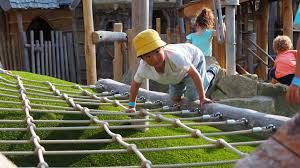
Unleashing Creativity and Fun: The Thrilling World of Adventure Play
The Thrill of Adventure Play: Unleashing Creativity and Fun
Adventure play is more than just swinging on monkey bars or sliding down a slide. It’s about exploration, discovery, and pushing boundaries in a safe and exciting environment. From climbing walls to rope courses, adventure play offers children the opportunity to challenge themselves physically and mentally while having a blast.
One of the key benefits of adventure play is its ability to foster creativity. When children engage in adventurous activities, they are encouraged to think outside the box, problem-solve, and imagine new possibilities. Whether they are navigating obstacle courses or building forts, adventure play sparks their imagination and helps them develop critical thinking skills.
Moreover, adventure play promotes physical fitness and coordination. Climbing structures, balancing on beams, and jumping across platforms all contribute to improving children’s motor skills and overall health. By engaging in these dynamic activities, children not only stay active but also learn to trust their bodies and capabilities.
Another important aspect of adventure play is the sense of accomplishment it provides. Conquering a challenging course or reaching the top of a climbing wall instils confidence in children and teaches them the value of perseverance. Through trial and error, they learn that setbacks are part of the journey towards success.
Adventure play also encourages social interaction and teamwork. Children often collaborate with their peers to overcome obstacles or create imaginative scenarios. This fosters communication skills, empathy, and cooperation – essential qualities for navigating the complexities of relationships later in life.
In conclusion, adventure play offers a holistic approach to child development by combining physical activity with cognitive challenges and social engagement. It empowers children to take risks, explore their capabilities, and embrace new experiences with enthusiasm. So next time you see a jungle gym or a zip line beckoning – don’t hesitate to join in on the adventure!
7 Key Benefits of Adventure Play for Children’s Development
- Promotes creativity and imagination
- Enhances physical fitness and coordination
- Builds confidence and self-esteem
- Encourages problem-solving skills
- Fosters social interaction and teamwork
- Provides a sense of accomplishment
- Helps children learn to take risks in a safe environment
Potential Drawbacks of Adventure Play for Children
- Risk of minor injuries such as scrapes or bruises during physical activities.
- Children may become overconfident and attempt risky feats beyond their abilities.
- Some children may feel intimidated or left out if they are not comfortable with adventurous play.
Promotes creativity and imagination
Adventure play, with its myriad of stimulating activities and challenges, serves as a fertile ground for nurturing creativity and imagination in children. By engaging in adventurous tasks such as building forts, navigating obstacle courses, or inventing imaginative scenarios, children are encouraged to think outside the box, explore new possibilities, and let their imaginations soar. This pro of adventure play not only sparks creative thinking but also helps children develop problem-solving skills and the ability to envision worlds beyond the constraints of reality.
Enhances physical fitness and coordination
Engaging in adventure play activities such as climbing walls, balancing on beams, and navigating obstacle courses not only provides endless fun but also contributes significantly to enhancing children’s physical fitness and coordination. These dynamic challenges require children to use their muscles, improve their balance, and sharpen their coordination skills, leading to better overall physical health. By actively participating in adventure play, children develop strength, agility, and spatial awareness, setting a strong foundation for a lifetime of active and healthy living.
Builds confidence and self-esteem
Engaging in adventure play activities such as climbing walls and obstacle courses can significantly boost children’s confidence and self-esteem. By overcoming physical challenges and pushing their limits in a supportive environment, children learn to trust in their abilities and believe in their capacity to tackle new tasks. Each successful climb or conquered obstacle reinforces their sense of accomplishment, empowering them to take on bigger challenges with a positive mindset. This growth in self-assurance not only benefits their performance in adventurous play but also translates into everyday life, helping them approach challenges with resilience and self-belief.
Encourages problem-solving skills
Adventure play is a fantastic way to encourage problem-solving skills in children. When faced with obstacles such as climbing walls or rope courses, children are challenged to think creatively, strategize their next moves, and find solutions to navigate the challenges ahead. By engaging in adventurous activities that require them to overcome hurdles and puzzles, children develop critical thinking abilities and learn how to approach problems with confidence and determination. This not only enhances their cognitive skills but also instils a sense of resilience that will serve them well in various aspects of their lives.
Fosters social interaction and teamwork
One of the significant benefits of adventure play is its ability to foster social interaction and teamwork among children. Engaging in adventurous activities such as navigating obstacle courses or building forts encourages collaboration and communication with peers. Through working together to overcome challenges, children learn valuable skills such as empathy, cooperation, and problem-solving. This aspect of adventure play not only strengthens their relationships with others but also prepares them for successful interactions in various social settings throughout their lives.
Provides a sense of accomplishment
Engaging in adventure play activities provides children with a profound sense of accomplishment. Whether they conquer a challenging obstacle course, reach the summit of a climbing wall, or successfully navigate a tricky rope course, each achievement boosts their confidence and self-esteem. This feeling of accomplishment not only validates their efforts but also instils in them the belief that with determination and perseverance, they can overcome obstacles and achieve their goals. Adventure play teaches children the value of hard work and resilience, nurturing a positive mindset that extends beyond the playground and into all aspects of their lives.
Helps children learn to take risks in a safe environment
Adventure play provides a valuable opportunity for children to learn how to take risks in a safe and controlled environment. By engaging in challenging activities such as climbing walls or rope courses, children can push their boundaries and test their limits without fear of serious consequences. This allows them to develop a sense of adventure, build confidence in their abilities, and learn how to assess and manage risks effectively. Through these experiences, children gain valuable life skills that will serve them well as they navigate new challenges and opportunities in the future.
Risk of minor injuries such as scrapes or bruises during physical activities.
One potential drawback of adventure play is the risk of minor injuries, such as scrapes or bruises, that can occur during physical activities. While these injuries are usually minor and part of the learning process, they can still be a concern for parents and caregivers. Children may get a little too enthusiastic while climbing or exploring, leading to bumps and bruises along the way. It’s important to strike a balance between encouraging adventurous play and ensuring safety measures are in place to minimise the risk of harm.
Children may become overconfident and attempt risky feats beyond their abilities.
One potential downside of adventure play is that children may develop overconfidence and attempt risky feats that exceed their abilities. While it’s important for children to challenge themselves and push their limits, unchecked overconfidence can lead to accidents or injuries. Encouraging a balance between exploration and caution, along with providing proper supervision and guidance, can help mitigate this risk and ensure that children engage in adventurous activities safely and responsibly.
Some children may feel intimidated or left out if they are not comfortable with adventurous play.
For some children, the prospect of adventurous play can be daunting, leading to feelings of intimidation or exclusion if they are not at ease with such activities. The fast-paced and physically demanding nature of adventure play may create a sense of unease for those who prefer more low-key or familiar forms of play. This can result in these children feeling left out or isolated from their peers who thrive in adventurous settings. It is important to acknowledge and respect each child’s comfort level and provide alternative play options to ensure that all children feel included and valued in the play environment.



